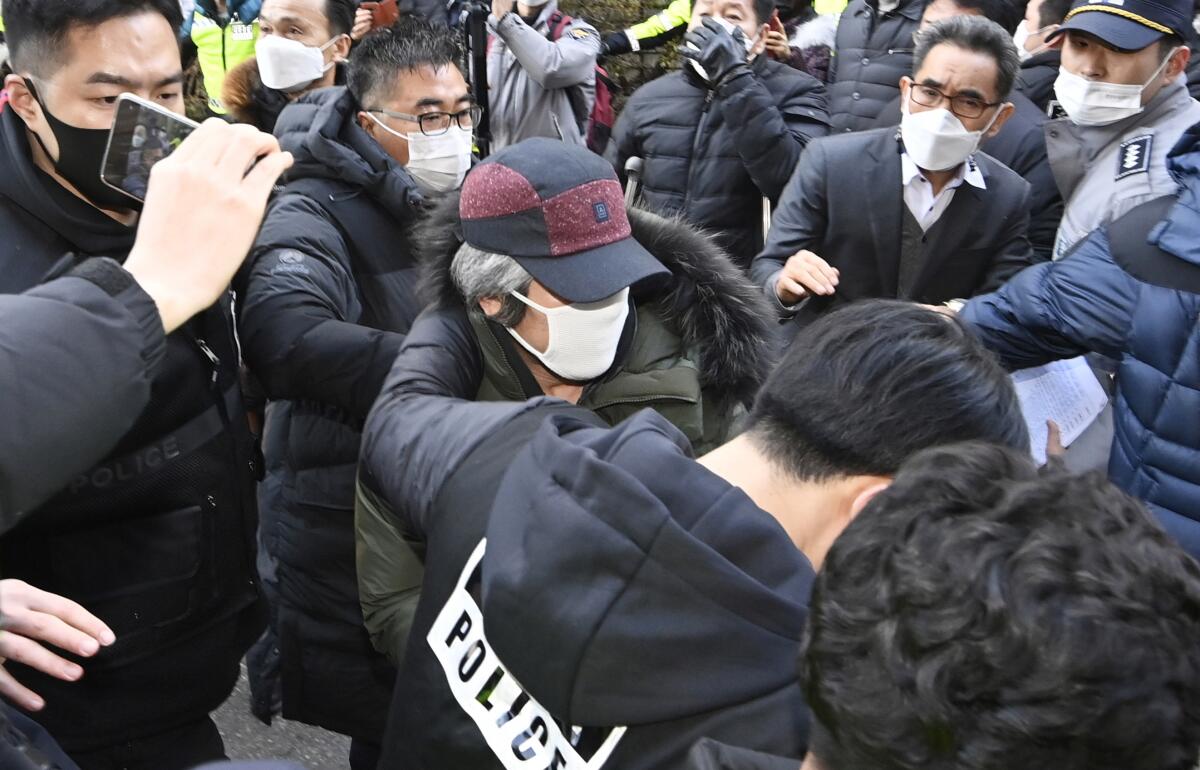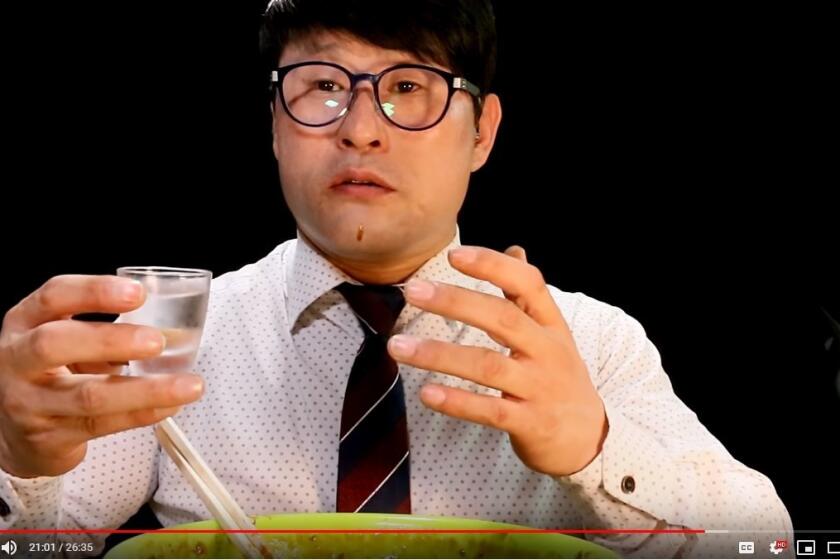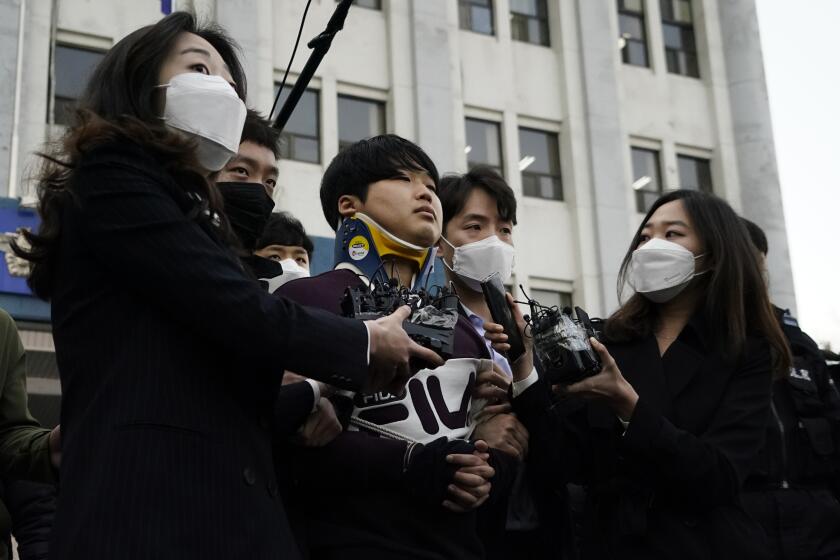A notorious child rapist was released from prison. Hordes of YouTube vigilantes awaited

- Share via
SEOUL — He was ready, he told his viewers, showing off the wares he’d amassed for the big day: a large bag of flour, a carton of eggs and a motorcycle helmet.
Song Dae-ik, a 27-year-old YouTuber known for gaming videos and silly antics, had pledged to beat up notorious child rapist Cho Doo-soon the day Cho was released from prison after serving a 12-year sentence. Song counted down the days, drove four hours to scope out the prison where Cho was being held and began his stakeout at midnight the day of the man’s release.
So did dozens of other YouTubers from across South Korea, all promising vigilante justice.
Now, at least four of them face criminal charges for obstruction of justice, destruction of property and battery after Cho’s release last week devolved into a melee of attention-seeking YouTubers mobbing the car carrying Cho, jostling for better camera angles and trying to one-up each other for more sensational footage.
“They’re after the clicks — this is amusing to them,” said Kim Se-gon, chief of detectives at the Ansan Danwon Police Department, which investigated Cho’s brutal 2008 rape of an 8-year-old girl in a church bathroom.
Loneliness is a problem in South Korea, where people are turning to YouTube for companionship — and fatherly advice
Kim, who was part of the police presence in Ansan when Cho was escorted home Saturday, estimated that more than 100 YouTubers had descended on the scene. They shouted insults, clashed with officers and tried to slip into the building where Cho was slated to live with his wife. One YouTuber, a mixed martial arts fighter once known as the Iron Gentleman, kicked in the side of the government vehicle carrying Cho. Another leapt atop the car and repeatedly stomped his foot, denting the roof.
Yet another ordered Chinese food to be delivered to Cho’s apartment and, when it couldn’t get through, livestreamed himself eating it. A fellow YouTuber who took offense at the move sought him out and sucker-punched him — on camera, of course.
The bedlam added a bitter postscript to a shocking crime that sparked nationwide outrage because of the victim’s age, the severity of her injuries and what many felt was the lenience of Cho’s sentence. Cho kidnapped the girl on her way to school and beat and choked her unconscious before raping her, causing severe internal injuries.
The chaos surrounding Cho’s release also highlighted the skyrocketing popularity of YouTube in South Korea — now the country’s most-used app — and the dubious lengths to which many users have gone to attract viewers. Vigilantism, here and elsewhere, is a growing trend on social media platforms, with child predators a frequent target. “To Catch a Predator”-type stings attempting to nab alleged pedophiles have gone viral on YouTube and TikTok, encouraging copycats.
“They were competing among themselves,” Kim said of the YouTubers who converged on the scene of Cho’s release.
Prosecutors had sought a life term for Cho, but the court sentenced him to 12 years, deeming his alcohol use a mitigating circumstance. Cho, who had a long rap sheet that included attempted rape, claimed he had no memory of the incident because he was too drunk.
As his release date approached, various YouTubers began talking about Cho on their videos or live broadcasts, saying they were going to seek justice. Subscribers egged them on.
“They’re after the clicks — this is amusing to them.”
— Kim Se-gon, chief of detectives, Ansan Danwon Police Department
Myung Hyun-man, the mixed martial arts fighter who once pledged to kick Cho in the genitals, said Cho’s case got his blood boiling because he himself had a young daughter. His YouTube channel, with 137,000 subscribers, features videos of him chasing after a drunk driver and confronting a used car salesman allegedly trying to con customers, among other stunts.
“I’d been thinking about it for a year,” he said in a brief phone interview before he was charged for his actions. “I felt the urge to inflict violence when he got out. ... My anger would ebb, then flare up again.”
Myung went to the scene of Cho’s release about 10 p.m. the night before Cho was due out. A cameraman filmed him looking for Cho among throngs of police, onlookers and other YouTubers for hours; the video was streamed live on YouTube. At one point, Myung broke into a run and kicked the side of the government vehicle carrying Cho, then was wrestled to the ground by officers.
The video racked up more than a million views. By Friday, after he was officially charged for causing property damage, it had been taken down. Myung instead posted a video apologizing for his “rash” actions.
Kim, of the police department, said he sympathized with the public outrage over Cho and his crime but said it was apparent that the YouTubers were seeking attention and profit, not justice.
“It was obvious what they were after,” he said. “It was over the top.”
Cho Ju-bin masterminded one of South Korea’s most notorious sex crime schemes, blackmailing young women into providing sexually compromising images.
Earlier this year, market research firm WiseApp found that South Koreans spent more than twice as much time on YouTube than they did on any other smartphone app. Time spent on the app grew by 20% in September 2020 compared with a year earlier.
The city of Ansan this week sent a request to YouTube to remove videos of Cho’s release and to block live broadcasts from his neighborhood, saying residents had been harassed and suffered privacy violations by the YouTubers, many of whom camped out overnight. “Residents are suffering serious torment due to the YouTubers’ competing broadcasts,” Mayor Yoon Wha-Sub said in a statement.
A public relations firm for YouTube Korea said the video-sharing platform advised the city of its normal procedures for content-removal requests for privacy or safety concerns.
Cho, 68, will wear an ankle bracelet to track his movements, cannot have a blood alcohol level above 0.03% and is banned from leaving his home after 9 p.m for seven years. Authorities have installed hundreds of new closed-circuit TV cameras and LED lights in his neighborhood, saying he will be monitored 24/7.
As for YouTuber Song, who was not among those charged, he spent hours circling the scene and trying to get close to Cho — even attempting at one point to scale a fence — but never got close. In a video misleadingly titled “Met Cho Doo-soon (the child rapist),” he apologized to his subscribers, saying he had failed to keep his promise to them that he would do something to punish Cho.
“I wasn’t able to do anything. I feel like a wuss,” he said in the video.
But if it was attention he wanted, along with the ad revenue that comes with it, he got it. As of Friday afternoon, the video had gotten 1.6 million views.
More to Read
Sign up for Essential California
The most important California stories and recommendations in your inbox every morning.
You may occasionally receive promotional content from the Los Angeles Times.
















